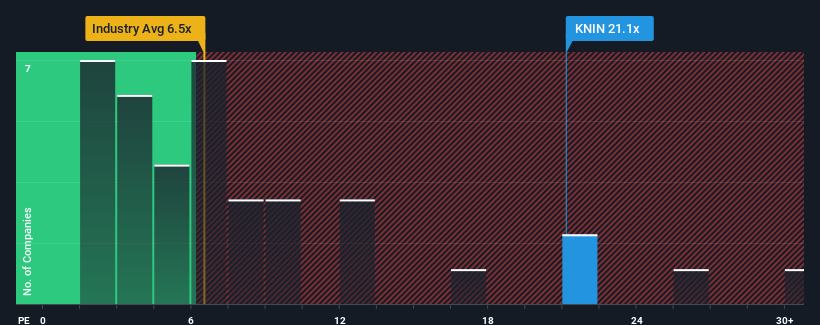- Switzerland
- /
- Marine and Shipping
- /
- SWX:KNIN
There's Reason For Concern Over Kuehne + Nagel International AG's (VTX:KNIN) Price

Kuehne + Nagel International AG's (VTX:KNIN) price-to-earnings (or "P/E") ratio of 21.1x might make it look like a sell right now compared to the market in Switzerland, where around half of the companies have P/E ratios below 18x and even P/E's below 12x are quite common. However, the P/E might be high for a reason and it requires further investigation to determine if it's justified.
While the market has experienced earnings growth lately, Kuehne + Nagel International's earnings have gone into reverse gear, which is not great. It might be that many expect the dour earnings performance to recover substantially, which has kept the P/E from collapsing. You'd really hope so, otherwise you're paying a pretty hefty price for no particular reason.
See our latest analysis for Kuehne + Nagel International

How Is Kuehne + Nagel International's Growth Trending?
In order to justify its P/E ratio, Kuehne + Nagel International would need to produce impressive growth in excess of the market.
Taking a look back first, the company's earnings per share growth last year wasn't something to get excited about as it posted a disappointing decline of 44%. However, a few very strong years before that means that it was still able to grow EPS by an impressive 109% in total over the last three years. Accordingly, while they would have preferred to keep the run going, shareholders would probably welcome the medium-term rates of earnings growth.
Looking ahead now, EPS is anticipated to slump, contracting by 5.4% per year during the coming three years according to the twelve analysts following the company. That's not great when the rest of the market is expected to grow by 8.4% per annum.
With this information, we find it concerning that Kuehne + Nagel International is trading at a P/E higher than the market. Apparently many investors in the company reject the analyst cohort's pessimism and aren't willing to let go of their stock at any price. There's a very good chance these shareholders are setting themselves up for future disappointment if the P/E falls to levels more in line with the negative growth outlook.
The Bottom Line On Kuehne + Nagel International's P/E
We'd say the price-to-earnings ratio's power isn't primarily as a valuation instrument but rather to gauge current investor sentiment and future expectations.
Our examination of Kuehne + Nagel International's analyst forecasts revealed that its outlook for shrinking earnings isn't impacting its high P/E anywhere near as much as we would have predicted. When we see a poor outlook with earnings heading backwards, we suspect the share price is at risk of declining, sending the high P/E lower. This places shareholders' investments at significant risk and potential investors in danger of paying an excessive premium.
There are also other vital risk factors to consider and we've discovered 2 warning signs for Kuehne + Nagel International (1 is a bit concerning!) that you should be aware of before investing here.
Of course, you might also be able to find a better stock than Kuehne + Nagel International. So you may wish to see this free collection of other companies that have reasonable P/E ratios and have grown earnings strongly.
Valuation is complex, but we're here to simplify it.
Discover if Kuehne + Nagel International might be undervalued or overvalued with our detailed analysis, featuring fair value estimates, potential risks, dividends, insider trades, and its financial condition.
Access Free AnalysisHave feedback on this article? Concerned about the content? Get in touch with us directly. Alternatively, email editorial-team (at) simplywallst.com.
This article by Simply Wall St is general in nature. We provide commentary based on historical data and analyst forecasts only using an unbiased methodology and our articles are not intended to be financial advice. It does not constitute a recommendation to buy or sell any stock, and does not take account of your objectives, or your financial situation. We aim to bring you long-term focused analysis driven by fundamental data. Note that our analysis may not factor in the latest price-sensitive company announcements or qualitative material. Simply Wall St has no position in any stocks mentioned.
About SWX:KNIN
Kuehne + Nagel International
Provides integrated logistics services worldwide.
Excellent balance sheet and fair value.


